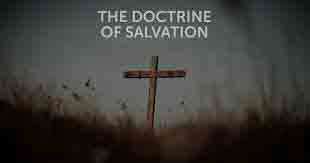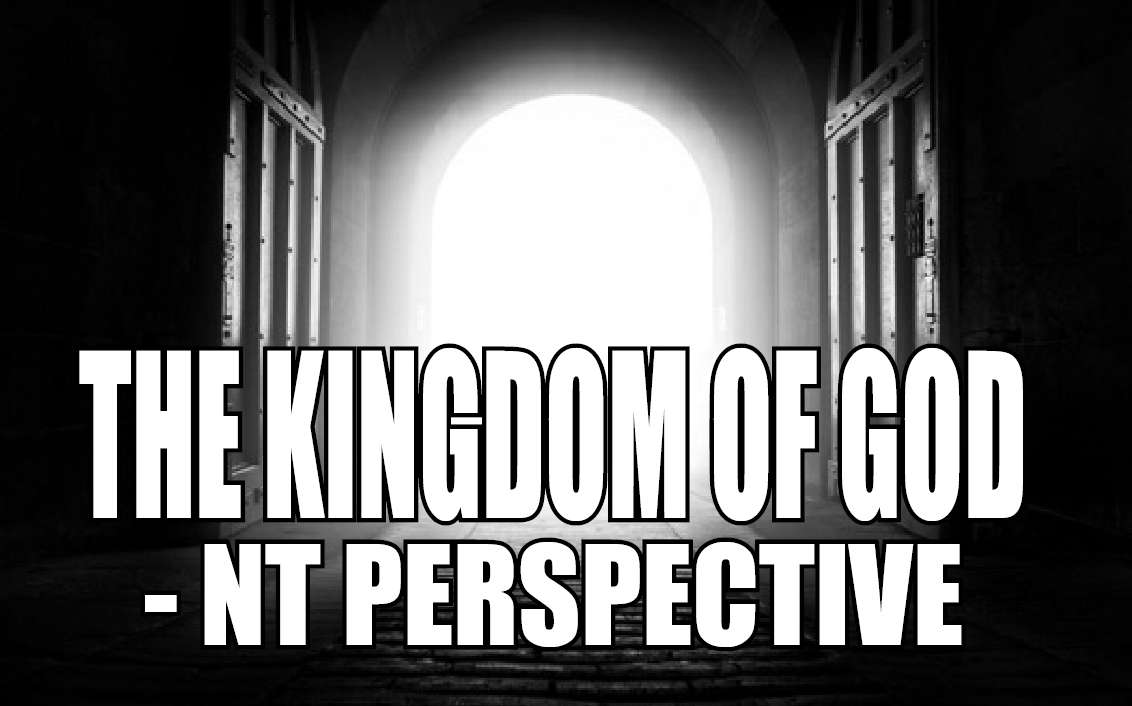

The Doctrine of Salvation and Repentance
Pr. Gibson Joy
In Genesis 22, we find a most heart-wrenching plot orchestrated by God himself. Abraham is going up Mt. Moriah in response to God’s demand to sacrifice his son Isaac. Isaac oblivious to God’s command realised that they had everything except the lamb for the sacrifice. Almost 1500 years later, we’ll see the same plot mirrored exactly. Only this time, the Son will be the God-man – Jesus Christ.
Salvation is not only a recurring theme within the Bible (mentioned 50 times in its various forms throughout the Bible), it is also the theme of the Bible – God working out salvation for His people. Therefore, the message of salvation is central to the message of the Church. Without it, the Church would not have a message to preach.
The word ‘Salvation’ comes from the Greek word soterion which means rescue, deliverance, safety, liberation. Another form of the word soteria signifies forgiveness, healing, prosperity, deliverance, safety, rescue, liberation and restoration. The New Spirit Filled Life Bible states, “It means salvation from physical death by healing and from spiritual death by forgiving sin and its effects.”
Therefore we understand salvation to mean a great deliverance both physically and spiritually. The theme runs through the Bible for example in the way God provided for Abraham a sacrifice to be offered in Isaac’s stead thereby saving his life (Gen 22:1-18), how He preserved the people of Israel during the great famine and brought them to Egypt (Gen 37-50), how He delivered them from slavery in Egypt miraculously and brought them into the Promised Land (Exodus, Joshua). So physical deliverance has always been part of God’s plan for His people. But more importantly, spiritual deliverance lies at the heart of God’s will for the entire world, which He would work out later in Jesus. A plan God set into motion even “before the foundations of the world” (Rev 13:8).
In this article, we will focus on the salvation provided by God in Jesus Christ.
The Need for Salvation
Why was there a need for salvation and how that was to be provided?
Sin is anything that is done that is contrary to the nature of God. God’s nature in relation to us is Holy. We know there are living creatures in heaven ascribing to God the superlative of holiness every moment of every day (Is 6:3; Rev 4:8). God is so holy, that our very definition of sin is based on His nature. God doesn’t have to try to do good, or be pure. He is holy. Therefore when He created man, He created him to be Holy. But human beings sinned. Moral failure is only a consequence of the primary sin which is rejection of faith in God. Unbelief is the first and foremost sin which leads to all other ‘secondary’ sins (Rom 1:21). This is where all humanity has fallen. The sin in the garden of Eden was precisely this – human beings telling God that they do not want His life and way but would rather decide for themselves what is good and evil(Gen 3).
Thus, the following:
i. Sin is universal: Every human being who was ever born has sinned (1 Kg 8:46; Ps143:2; Prov 20:9; 12; Rom 3:23; Gal 3:22)
ii. Sin in God’s eyes not only alludes to sinful acts committed but also to the sinful nature possessed. This is why the whole world stands condemned in God’s sight because of the sinful nature. The wrath of God is thus revealed against sin. This should not be thought of in terms of God inflicting disease and pain on all sinners but rather God giving people over to the lusts and desires of their hearts and the consequences thereof. The world as we see it today with all its evil, violence, natural calamities is a result of sin. Thus God’s redemptive plan includes physical restoration which will be perfected at the consummation (Rom 8:22-24; Rev 21:1-3).
iii. The Cause of all sin that has affected creation is the sin of Adam. (Rom 5:12-19)
Due to sinful nature, human beings are incapable in and of themselves to save and live a righteous life. Some desires seem natural and harmless but are directly contrary to God’s intention for life (Rom 1:26-32. These desires arise due to the fallen nature of humans.
The Wages of Sin
Since God is holy, He cannot be associated with anything sinful. Therefore, all human beings being sinful are condemned to a life of eternal separation from God. The “death” spoken of in Scripture signifies eternal condemnation and separation. Eternal separation is devoid of the grace and presence of God completely. In Jesus’ parable of Lazarus and the rich man, we see that this as a place of unbearable pain, regret and shut out from God’s presence (Lk 16:19-31; Mt 22:13). This place is reserved only for the devil and his demons (Rev 20:10) a place of eternal torment and punishment. It is not God’s desire that even one person perish in this way (John 3:16; 2 Peter 3:9).
But due to the effect of sin, all humankind is guilty of violating God’s perfect law. If we are guilty, there is no other escape but death. “The soul who sins must die” (Ez 18:4, 20). This was the hopeless state of man.
God’s Provision
God, the Creator of all, did not want humankind to perish in this way. And therefore, in His law, made provisions for human beings to atone for sin. To atone for sin, a death is necessary. Blood must be shed. This is because in God’s created order, “life is in the blood”. In Leviticus 17:11, God says, “For the life of a creature is in the blood, and I have given it to you to make atonement for yourselves on the altar; it is the blood that makes atonement for one’s life.” Therefore, we infer that in order to escape the punishment for sin, we need a “scapegoat”.
We do know that shedding animal blood for human sin is insufficient (Heb 10:3,4). It was because of this insufficiency that the same sacrifices had to be performed for the same sins year after year. They served as a forward looking testament to the coming of Jesus.
The Need for a New Covenant – How Jesus Achieved Salvation on our Behalf
The image of God in humankind was marred due to sin. God’s intention was always that they would be conformed to His likeness. This is why God spoke through the prophets Ezekiel (36:24-26) and Jeremiah (31:31-33) speaking of a new covenant which would not only cleanse human beings of all filth but also by the power of God’s Spirit give them a new heart which would be able to fulfill God’s law completely.
In giving His life for us, Jesus was instating a new covenant (Lk 22:20; Heb 8:13; Heb 9:15). Under this covenant, one could be the temple of the living God with the power and life of God enabling them to be all they were created to be – In God’s likeness. How did Jesus achieve this?
• Jesus was absolutely sinless in His nature (Lk 1:35; Jn 14:30), conduct (Heb 7:26; Jn 8:46) and even in the face of temptation (Heb 4:15).
• Jesus is God who became a Man. Being fully capable of fulfilling all righteousness.
• He came that He might die for the sins of the world and give His life as a ransom for many (Mk 10:45; Heb 2:9,14,26)
• His death was substitutionary. He didn’t die for His own sins, being sinless as He was, He died for the sins of others (Jn 8:46; Heb 4:15; Isa 53:4-6, 8, 10-12; Rom 5:8; 1 Cor 15:3; 2 Cor 5:21)
• His death satisfied:
The Justice of God: We can accept this substitute and not have our sins counted against us (Rom 3:25,26; Is 53:4-6; Mt 8:17)
The Law of God: Jesus’ righteous life completely fulfilled God’s law. Christ fulfilled all the law and thereby is able to make us righteous in God’s sight. (Mt 5:17; Rom 7:14; Rom 8:3,4)
• His blood was the atoning sacrifice for our sins. Not the blood of an animal. But being 100% human, he was an acceptable atoning sacrifice. And being 100% divine, it was a timeless sacrifice i.e. Once for all (1 John 2:2; Heb 7:27; 10:3,11,12)
• Through His life-blood shed, God can now forgive sins. We are saved from death and eternal damnation and can be forgiven for our sins (Eph 1:7)
• Through Christ’s death, the whole world now can be reconciled to God. (Rom 5:10,11; 2 Cor 5:18-20; Eph 2:16; Rom 11:15; Col 1:20)
• His death was the redemption-price to satisfy God’s justice. Thus Jesus, through His death, redeemed us from:
The curse of the Law: Gal 3:13 - He redeemed us by becoming a curse Himself.
The Law itself - Rom 6:14
The dominion and power of sin: Rom 6:6; Tit 2:14; 1 Pet 1:18,19
The fear of death: Heb 2:14,15
• Jesus’ death was for the whole world - 1 Tim 4:10; Jn 1:29; 1 Tim 2:6; Tit 2:11; 2 Pet 3:9; Heb 2:9; 1 Jn 2:2; Jn 3:16
How Salvation is Applied or Appropriated
The only way to bring restoration is to choose to believe and put faith in God – who He is and what He has done. This is why Jesus came (John 17:3; John 1:7). He came as a testament to the truth and that we might believe. And in believing, we might be saved by His grace.
The first step to conversion begins with the work of the Holy Spirit to illuminate the mind of the hearer to understand and be convicted of sin. Paul explains in 2 Cor 4:3, 4 that the ‘god of this age has blinded the minds of unbelievers’. Therefore, unless the Holy Spirit brings conviction and illumination, no one can respond (John 16:8; 1 Cor 12:3). But only those whom the Father draws near can come (Jn 6:44). Thus there is a call from God that every person who believes responds to. This preludes conversion.
Erickson states, “Conversion is the act of turning from one’s sin in repentance and turning to Christ in faith”. So we see there are two main (inseparable) aspects to conversion.
• Repentance:
Repentance is the feeling of deep sorrow and regret for present lifestyle and the abandonment of it. It involves heart, mind and will (Cor 7:9,10, Acts 2:14-40)
There are two words used for repentance in the New Testament:
Metamelomai – which means to have a feeling of care, concern or regret (Mt 21:32; 27:3)
Metanoia – which means to think differently about something or to have a change of mind (Mt 3:2)
Thus we may infer that repentance doesn’t only involve “feeling bad” about something but the feeling runs so deep that it affects one’s future course of action.
The Bible makes it very clear that repentance is a prerequisite for salvation (Acts 2:38; Mt 4:17; Lk 24:46, 47). Biblical faith is one that always is accompanied by faith-filled action. Therefore, to put our faith in God will mean obey Him in keeping with a repentant heart.
Faith
In addition to repentance, faith is required to complete the work of conversion – Faith in the person and the finished work of Jesus Christ. There is nothing we can do in our own effort to be accepted by a righteous and holy God. It also must be understood that faith is not a one-time event but rather a lifestyle for the believer (Rom 1:17). Therefore this salvation is “by faith – from first to last” (Rom 1:17; 2 Cor 5:7; Gal 2:20).
We must also note that faith involves not only believing. Even the demons do that. But one’s faith is evidenced by faith-filled action. In this case – radical obedience to God (James 2:17-26; Eph 2:10).
The Effects/ Evidence of Salvation
Salvation affects every part of our person – body, soul, spirit.
• At the spirit level, our spirits which were dead in sin and incapable of having a relationship with God was resurrected anew. Completely new, holy, blameless and righteous in the sight of God. It is an event we call regeneration. This happens the moment we repent and put our faith in Jesus and is completely the work of the Holy Spirit:
Our sins are forgiven because of what Jesus did at the cross. No matter how great our sin, we are justified in the sight of God by faith and through His grace (Rom 3:23; 6:3; 5:1-10; Titus 3:3)
We are declared righteous in the sight of God (Eph 1:3-5; 2 Cor 5:21; Rom 8:1,33,34; Rom 4:7,8).
We are now friends of God, co-heirs with Christ (Js 2:23; Rom 8:16; Gal 3:26)
The Holy Spirit comes into us the moment we are saved and raises our spirit anew in the sight of God (2 Cor 5:17; Eph 1:11-13; Rom 8:11).
We are born ‘again’ into the kingdom of God (Jn 3:3-5) and are now citizens of heaven.
We are now holy, blameless and free from accusation in the sight of God. (Col 1:20-22)
We are now Children of God (Gal 4:6,7), adopted as Sons (Rom 8:14)
Spiritually united with Christ (1 Cor 6:17; Rom 8:9-13), seated with Christ in the spiritual realm (Eph 2:1-6)
• At the heart/ mind level, the Holy Spirit now sets into motion the process by which we have the mind of Christ to completely live and act according to His will. This is the process of sanctification. If regeneration is an event, sanctification is a process. Transformation from a sinful lifestyle to a righteous lifestyle experientially is a day-to-day process. This happens as we
Submit to the authority of the Word of God (Heb 4:12; Rom 12:1)
Continue in intimate fellowship with Jesus (Jn 15:1-10; 2 Cor 3:17,18)
Habitually living in fellowship with and in the power of the Spirit of God (Gal 5:16, 24).
Apply and Practice God’s Word in our daily lives (Jn 8:31,32; Js 1:22-25)
As we practice these basic disciplines we will grow mature as those who are able to distinguish between good and evil (Heb 5:14).
This is the life that is in keeping with saved, and sanctified sinner who is now a Spirit-filled saint. As long as were alive, the Holy Spirit will continue to mould and shape us, with greater intensity, power and authority, into the image of Jesus Christ Himself (Rom 8:29; 2 Cor 3: 18). This is the future hope of salvation that every believer possesses in Christ. It is an assurance guaranteed by the presence of the Holy Spirit in our lives that we will be with Him, made perfect, forever. (Rom 5:9, 10; Eph 1:11-13; Heb 7:25; 1 Cor 13:9,10; Rom 8:23).







